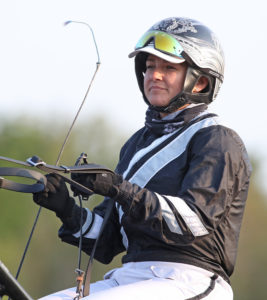

Takter fighting to remove the stain from Manchego’s record
The trainer said a troubling and questionable positive in Ohio for gabapentin — that
even the racing commission admits was “likely caused by environmental contamination” — could ruin the trotting mare’s chances to be enshrined in the Hall of Fame.
by Dave Briggs
Trainer Nancy Takter said she is fighting on to try to overturn a positive test Manchego received in Ohio in 2019 for multiple reasons, but chief among them is trying to remove the tarnish on the champion trotting mare’s otherwise sterling record.
“The reason that we’re still fighting it and the importance of it is because she loses eligibility to the Hall of Fame because of this positive,” Takter said, adding that she has appealed the decision to the courts.
“How are you protecting the sport when you’re clouding a horse that’s destined to be in the Hall of Fame? She’s had an amazing racing career. There aren’t very many that rival her racing career. You are putting doubt into the public. There are 10 articles written that ‘Nancy Takter gets a positive.’ It was in the Swedish newspapers and [Manchego] didn’t get invited to the Elitlopp. There were a lot of questions about this stupid positive in Ohio about the Elitlopp, but then COVID happened and we didn’t end up going, but that was one of their main concerns, was that she had a positive in Ohio.
On Sept. 7, 2019, Manchego raced in a $50,000 open at Scioto Downs as a tune-up for the Dayton Trotting Derby she won 10 days later by nine lengths. Yet, after the open, the mare — a three-time Dan Patch winner and world champion that earned over $3.1 million lifetime and had a mark of 1:49 — came up positive for gabapentin. Under the Association of Racing Commissioners International, gabapentin is a Class 3 drug. It is a pain killer normally prescribed to people that have neuropathic pain that does not respond to opiates or NSAIDs (nonsteroidal anti-inflammatory drugs).
At the time of Manchego’s positive, the Ohio State Racing Commission (OSRC) did not allow for any amount of gabapentin in a horse.
Around the same time as Manchego’s positive, multiple other horses received gabapentin positives after racing at Scioto Downs and the OSRC has admitted those positives were likely caused by contamination. Shortly after Manchego’s positive, the OSRC established a threshold limit for gabapentin. However, that threshold did not apply retroactively to those that received positives prior. The OSRC has not budged in the Manchego case.
In a OSRC report on the case dated Dec. 13, 2022, Andrew P. Cooke wrote:
“In conclusion, Manchego raced at Scioto Downs on Sept. 7, 2019 with trace amounts of gabapentin in its blood. The presence of gabapentin in Manchego’s blood was confirmed by the independent analysis requested by the respondent [Takter]. On Sept. 7, 2019, any amount of gabapentin in Manchego was a prohibited foreign substance and a violation of Ohio’s laws regulating horse racing. The origin of the gabapentin is unknown but was likely caused by environmental contamination. There is no evidence to suggest the respondent knowingly administered gabapentin to Manchego or that the gabapentin provided a competitive advantage. In October 2019, the Commission adopted a minimum threshold amount in testing for and reporting gabapentin that far exceeded the trace amount of gabapentin found in Manchego. The Commission’s decision to adopt a minimum threshold amount in testing for gabapentin in October 2019 did not alter the fact that Manchego raced on Sept. 7, 2019 with a prohibited foreign substance in its blood.
“It is recommended that the Ohio State Racing Commission uphold the decision of the judges… to suspend the respondent for 15 days and fine her $500 for the violation… It is also recommended that Manchego be disqualified from Race 15 at Scioto Downs on Sept. 15, 2019, and that all prize money be forfeited.”
Translation: At the time of Manchego’s positive, no gabapentin was allowed, regardless of circumstances. Therefore, due to the trainer responsibility rule, Takter was found guilty. As mentioned earlier, that decision is now headed to the courts.
But, regardless how that turns out, Takter is riled about the damage done already and the inflexibility of the OSRC, which she said, “knew they had a problem… because there was numerous emails going between the racing commission and the lab and, also, the racing commission actually hired an outside scientist to set a threshold for gabapentin, while we were all still racing.”
Takter said earlier on the same day Manchego raced, Standardbred Canada published an article that originated at Harness Racing Weekend Preview about a suspicious rash of gabapentin positives in Ohio. Takter said it’s further evidence that there was a problem. She wants to know why the OSRC continued to test for gabapentin that night and beyond.
“Now the next stage is that it goes to common court and all the evidence is presented to a real judge that knows nothing about horse racing and, hopefully, their judgment isn’t clouded by everything that they read out there because any time that someone wants to write anything about our sport, it’s about us drugging horses.”
Takter said the fact that there was obvious environmental contamination makes the case particularly vexing for her and all trainers that fall victim to something completely beyond their control.
“I feel like I need to keep fighting and speaking out about this because, as a trainer, it’s really unsettling to have your horse go through a test barn — be it a big race or a small race. We’re worried about these stupid, little contamination positives that we have no control over,” she said. “I said to the guy, ‘What did you want me to do differently?’ There was nothing that I could’ve done differently.”
Further, gabapentin is commonly-prescribed to humans. At a hearing with the OSRC, Takter’s lawyer Jim Gallagher presented evidence proving the prevalence of the drug in the general population.
“The interesting thing, too, about gabapentin that maybe people don’t realize is how stable it is in the environment and I don’t know if you read the statistics about how many grams are just in the environment floating around. There’s nothing you can do about this,” Takter said.
Takter is also rankled by the high sensitivity of drug tests that often pick up extremely miniscule amounts of substances that aren’t performance-enhancing in any way at such small levels.
“The testing labs nowadays are so sensitive that they could literally pick up minute, minute trace levels of whatever, which is not having any effect on any races or anything,” Takter said. “And they don’t have thresholds set for all the drugs… because it’s very expensive to set thresholds for drugs. So, there’s a lot of testing and research that needs to be done for each drug and at what level is each drug performance enhancing and so forth.
“It’s human nature that nobody wants to be wrong. Nobody wants to be told that they are wrong. Nobody wants their rules that they are trying to enforce to be wrong. Unfortunately, a lot of these rules are outdated and just haven’t been updated for the times.”
Takter further pointed out that it was wiretaps, not drug testing, that led to the recent rash of high-profile horse doping indictments.
“They didn’t catch a single one of them in the testing barn. Not a single one of them had a positive that is anything related to anything they got indicted on,” Takter said.
“But then you have honest trainers that keep getting these bogus, stupid positives because the lab is so sensitive to stuff that is completely irrelevant. [Ohio’s] own expert that they hired to set a threshold is saying that when [Manchego] raced it had no outcome or effect on that race.
“The problem is that it’s on all those [trainers’] records now and, God forbid, they do get another positive then they do have a record and you’re a repeat offender now. I don’t think a lot of people realize the situation that they get put in when you are a repeat offender when it comes to stuff like this.”
Apart from the harm to Manchego’s reputation, Takter said the case has damaged hers and the sport’s, as well.
“It pisses me off, too, because when this came out everybody wanted to brand you a cheater,” she said. “There are people like that and you have your jealous, hater people that want to say that everybody is a cheater, everybody that does well is obviously doing something wrong.”


















